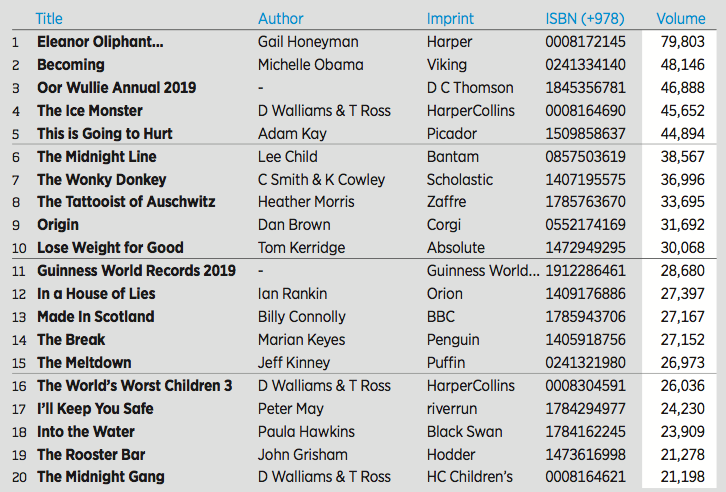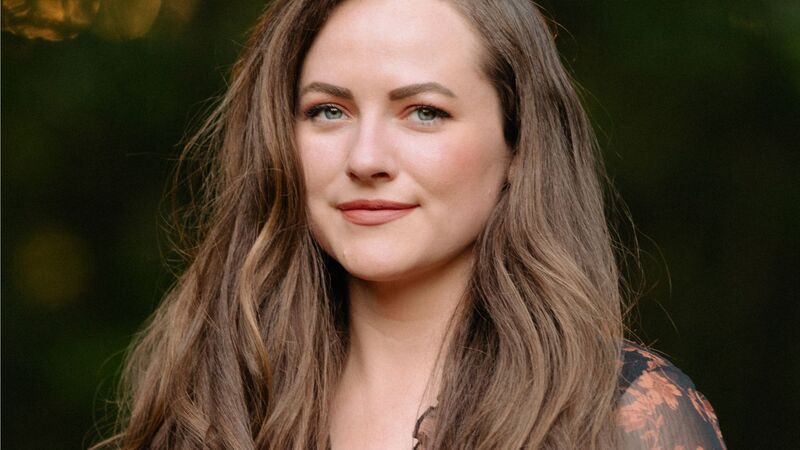You are viewing your 1 free article this month. Login to read more articles.
Charts: Scots back Billy, Wonky and Wullie
Scotland’s book market is doing marginally better than the UK as a whole. In 2018, 16.3 million books were sold in Scotland, for £137.2m, 2.5% up in value on 2017—slightly better than the UK’s 2.1% jump. Volume was up 0.6% year on year, ahead of the UK-wide 0.3% bump.
The balance of Scotland’s growth is interesting: the nation accounts for 8.24% of the UK in population terms, yet its book sales punch slightly above, with book sales north of the border accounting for 8.52% of the UK’s total volume. However, Scotland contributes a thrifty 8.42% of its value, which suggests that Scottish book-buyers are buying (slightly) more books, but with lower prices, than those in England, Wales and Northern Ireland.
As a whole, the average UK selling price hit a record of £8.53 in 2018, but Scotland’s was a whole 10p lower (£8.43). Michelle Obama’s Becoming, for example, sold for £14.41 on average in Scotland—20p lower than its UK-wide a.s.p. Speaking of Obama, her memoir finished two places higher in the Scottish chart than the UK one, with her sales north of Hadrian’s Wall contributing more than 9% UK volume.
But of course, even the former First Lady couldn’t beat Stirling born and bred Gail Honeyman, an author so Scottish that on winning the first-announced award at the 2018 British Book of the Year ceremony, she said: “This means all the other awards have to go to Scottish people, right?” Rather like crime writers Ian Rankin and Peter May—whose 2018 releases both feature in the top 20, with 26% and 23% of their sales coming from Scotland, respectively— Honeyman has been embraced by her compatriots. Eleanor Oliphant is Completely Fine, which sold 866,200 copies in paperback in the UK last year—becoming its bestselling book of the year in the process—sold 79,803 of those units in Scotland. That’s a 9.21% share, above the national split in population terms.
Though Craig Smith and Katz Cowley are based in New Zealand, their The Wonky Donkey was the picture book of choice among Scots in 2018. More than 17% of its UK sales came in Scotland. Here’s a sentence that would have made no sense a decade ago: the viral YouTube video that propelled The Wonky Donkey up the charts featured a Scottish grandmother reading the book aloud to her grandson, which could explain its popularity in Scotland.
David Walliams rules all when it comes to kids’ books in the UK, but even he couldn’t defeat the Oor Wullie Annual 2019 in Scotland, with The Ice Monster lagging 1,236 units behind. The Sunday Post’s 82-year-old comic strip was easily the kids’ number one in 2018, with nearly 70% of its sales generated in Scotland—by far the biggest proportion in the chart.
Another Scottish national treasure flying off the shelves north of the border was Billy Connolly, whose memoir Made in Scotland shifted 27,167 copies in 2018, 36% of its UK-wide total, and finished in 13th position—179 berths above its place in the UK chart. Connolly also seems to have emerged as 2019’s biggest bookfluencer, after John Kennedy Toole’s A Confederacy of Dunces (originally published in 1980) soared into the UK weekly Top 50 following a recommendation from the comedian, who named it his “favourite book of all time”. A hefty 25% of A Confederacy of Dunces’ sales last week were Scotland-based, meaning its sales in the nation have increased by 2,282% in the past fortnight.

Date range: 31st December 2017–30th December 2018, Source: Nielsen
In the spotlight
The House Between Tides by Sarah Maine, published by Hodder
We’ve seen the strength of Waterstones Books of the Month on the UK-wide market, but in Scotland they’re nearly Connolly-level influential. The retailer’s pick for Scottish book of the year, Hebrides-set gothic The House Between Tides, has shifted 92% of its total volume north of the border. Take that, Sally Rooney.
My Name’5 Doddie by Doddie Weir, published by Black & White
The memoir of the Scottish rugby legend, now suffering from motor neurone disease, was the biggest sports autobiography of the year in Scotland, selling 15,818 copies.













